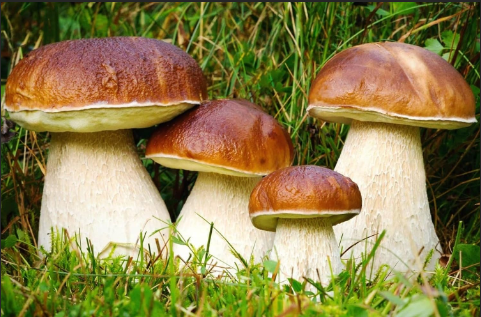
Boletus Edulis (Porcini)
Mushrooms are a Super-food
Bob Dozor MD
Mushrooms are on my Super-Food list. I’ve been a mushroom guy for a long time! I love eating them, and I love finding them in the wild. Please remember that there are wild mushrooms that can kill you, so be careful! However, it is nearly impossible to mistake these beautiful and delicious Porcinis (Boletus Edulis) for a deadly Amanita, but it has a cousin - Boletus Satanas (Devil’s Bolete) - that could make you sick (although not dead). So, if this hasn’t scared you off of Mushrooms, please know that Mushrooms are among the healthiest, umm, vegetable (?) in the grocery store. Mushrooms are actually not vegetables; they are neither plants nor animals. Fungi constitute a whole kingdom!
Mushrooms are edible fungus. They provide a range of antioxidants and other nutrients that may contribute to heart health and protect the body from cancer, among other benefits. They may enhance immunity to Covid 19, the Flu and other viruses!
Mushrooms contain a nice portfolio of nutrients that are good for everyone, and in particular are eaten as a meat substitute by many vegetarians and vegans (but stay tuned - they have some extra special nutrients too.)
Mushrooms are edible fungus. They provide a range of antioxidants and other nutrients that may contribute to heart health and protect the body from cancer, among other benefits. They may enhance immunity to Covid 19, the Flu and other viruses!
Mushrooms contain a nice portfolio of nutrients that are good for everyone, and in particular are eaten as a meat substitute by many vegetarians and vegans (but stay tuned - they have some extra special nutrients too.)
| Nutrient | Amount of nutrientTrusted Source in 1 cup of mushrooms | Recommended daily intakeTrusted Source |
|---|---|---|
| Energy (calories) | 21.1 | 1,600–3,200 |
| Protein (g) | 3.0 | 46–56 |
| Carbohydrate (g) | 3.1, including 1.9 g of sugar | 130 |
| Calcium (mg) | 2.9 | 1,000–1,300 |
| Iron (mg) | 0.5 | 8–18 |
| Magnesium (mg) | 8.6 | 310–420 |
| Phosphorus (mg) | 82.6 | 700–1,250 |
| Potassium (mg) | 305 | 4,700 |
| Sodium (mg) | 4.8 | 2,300 |
| Zinc (mg) | 0.5 | 8–11 |
| Copper (mcg) | 305 | 890–900 |
| Selenium (mcg) | 8.9 | 55 |
| Vitamin C (mg) | 2.0 | 65–90 |
| Vitamin D (mg) | 0.2 | 15 |
| Folate (mcg DFE) | 16.3 | 400 |
| Choline (mg) | 16.6 | 400–550 |
| Niacin (mg) | 3.5 | 14–16 |
Mushrooms also contain a number of B vitamins, including thiamine, riboflavin, B-6, and B-12.
Ergothioneine (ERGO)
A unique and powerful nutrient (an amino acid) in Mushrooms is Ergothioneine. ERGO has gained a lot of attention as a ‘longevity vitamin’ because consuming it is correlated with longer human life span (see graphs below)! ERGO is obtained in the diet mostly from eating mushrooms, but very importantly, ERGO is also found in vegetables grown in soil where mushroom mycelia are plentiful. Agricultural practices are very important in this regard; low tillage and lots of mulch nurture mycelia.
There is mounting evidence for the potential for the natural dietary antioxidant and anti-inflammatory amino acid l-Ergothioneine (ERGO) to prevent or mitigate chronic diseases of aging. This has led to the suggestion that it could be considered a ‘longevity vitamin.’ .... Mushrooms are, by far, the leading dietary source of ERGO, but it is found in small amounts throughout the food chain, most likely due to soil-borne fungi passing it on to plants.
There is a significant correlation between the low levels of ERGO in the American diet, and health impairments and increased mortality. (However, correlation is not necessarily causation.)
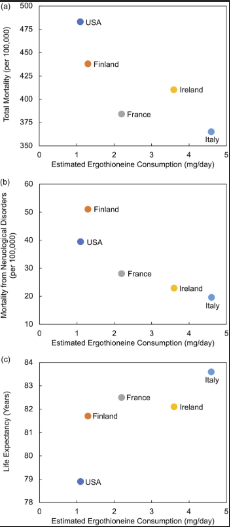
ERGO can be found plentifully in mushrooms you can buy at the store:
Penn State researchers found that among the most commonly consumed mushrooms, portabellas and criminis contain the highest levels of ergothioneine, followed closely by the more ubiquitous white button variety. A standard 3-ounce USDA serving of these mushrooms supplies up to 5 mg of ERG. The exotic mushrooms contain even more ergothioneine. The same 3-ounce serving of shiitake, oyster, king oyster, or maitake mushrooms can contain up to 13mg ERG. Even after cooking mushrooms, their levels of ergothioneine do not diminish.
But it gets even better: Shiitake, Maitake and Oyster mushrooms, exotic or not, are also common in markets and also contain lots of Beta-glucans, the other unusual and beneficial nutrient in mushrooms. They too are delicious!
Beta-glucans
ERGO is not the only super-nutrient in mushrooms. Beta-Glucans display important anti-cancer and anti-viral properties. While ERGO appears to prevent cancer, Beta-glucans inhibit tumor growth and spread. Mushroom beta-glucans also display anti-viral properties which may be effective in illnesses like Covid 19 and Influenza.
Beta-glucans, β-glucans comprise a group of β-D-glucose polysaccharides (glucans) naturally occurring in the cell walls of cereals, bacteria, and fungi....
The healing and immunostimulating properties of mushrooms have been known for thousands of years in the Eastern countries. These mushrooms contain biologically active polysaccharides that mostly belong to group of beta-glucans. These substances increase host immune defense by activating complement system, enhancing macrophages and natural killer cell function...
They can prevent oncogenesis due to the protective effect against potent genotoxic carcinogens. As immunostimulating agent, which acts through the activation of macrophages and NK cell cytotoxicity, beta-glucan can inhibit tumor growth in promotion stage too. Anti-angiogenesis can be one of the pathways through which beta-glucans can reduce tumor proliferation, prevent tumor metastasis. beta-Glucan as adjuvant to cancer chemotherapy and radiotherapy demonstrated the positive role in the restoration of hematopoiesis following by bone marrow injury.
The healing and immunostimulating properties of mushrooms have been known for thousands of years in the Eastern countries. These mushrooms contain biologically active polysaccharides that mostly belong to group of beta-glucans. These substances increase host immune defense by activating complement system, enhancing macrophages and natural killer cell function...
They can prevent oncogenesis due to the protective effect against potent genotoxic carcinogens. As immunostimulating agent, which acts through the activation of macrophages and NK cell cytotoxicity, beta-glucan can inhibit tumor growth in promotion stage too. Anti-angiogenesis can be one of the pathways through which beta-glucans can reduce tumor proliferation, prevent tumor metastasis. beta-Glucan as adjuvant to cancer chemotherapy and radiotherapy demonstrated the positive role in the restoration of hematopoiesis following by bone marrow injury.
Beta-glucan content in cultivated mushrooms
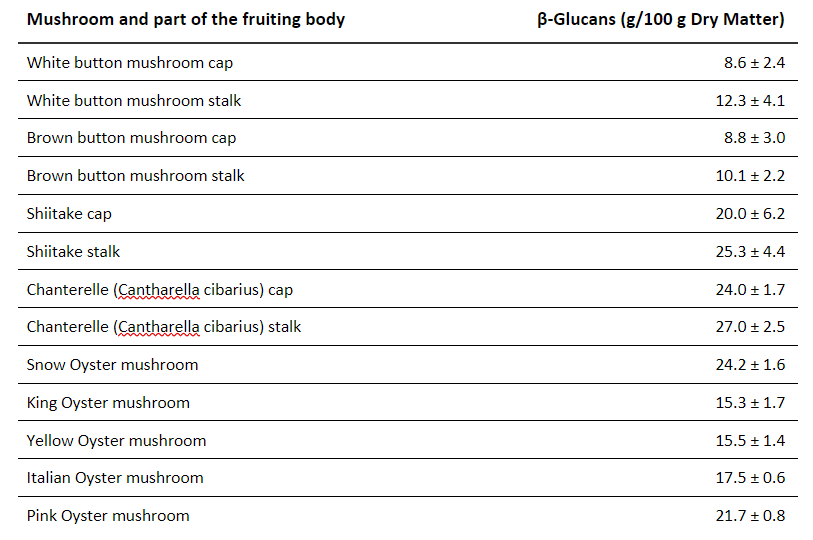
Source: Chiara Cerletti, Simona Esposito and Licia Iacoviello Created with Datawrapper
Personally, I eat – almost daily - Maitake, Shiitake or Porcini, aside from mushrooms I find in the field. While Porcini and Chantarelles are my flavor-favorites, Maitake and Shiitake are also very good and much less expensive.
Maitake mushroom (Grifola frondosa) has an earthy aroma and a wholesome taste. Rich in vitamin D, it helps everything from cancer support to bone health. Its distinctive shape has earned it the nickname “hen-of-the-woods.” It’s also known as sheep head and king of the mushrooms, with its most common name — maitake — meaning “dancing mushroom.”
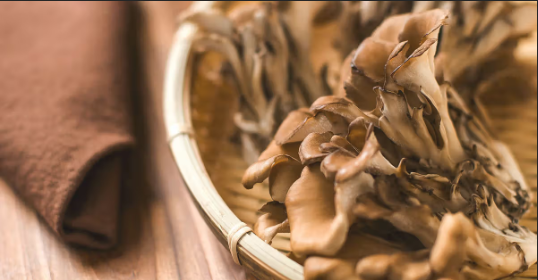
Maitake
I am often asked about the adaptogenic mushrooms such as Turkey Tail, Cordyceps, Chaga, Reishi and Lion’s Mane. I think they are harmless, but scientifically unproven. The culinary mushrooms I’ve written about in this blog, however, have substantial scientific evidence, are not very expensive, and taste divine.
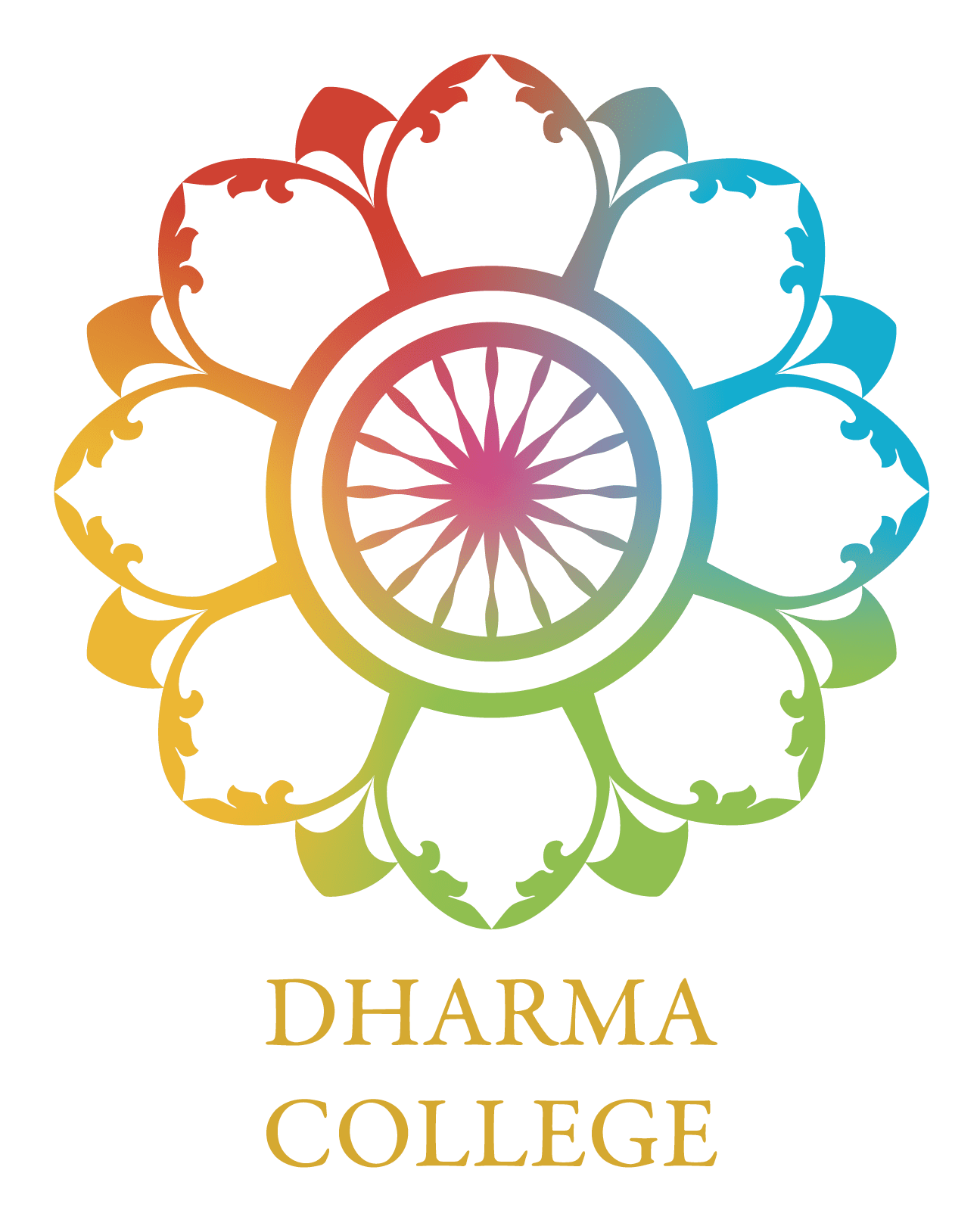
Contact
2222 Harold Way
Berkeley, CA 94704
(510) 704-1105
(510) 704-1105
Public
Copyright © 2025
